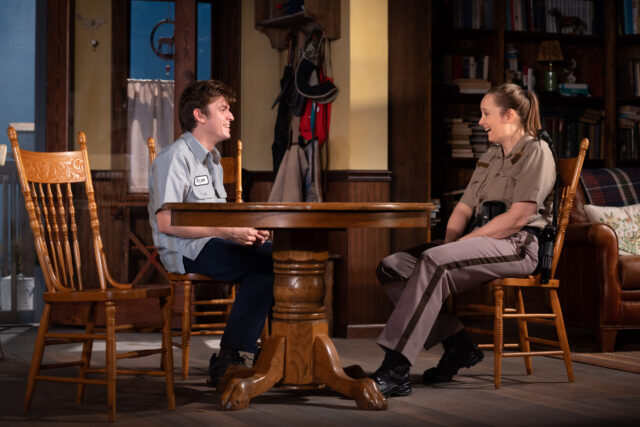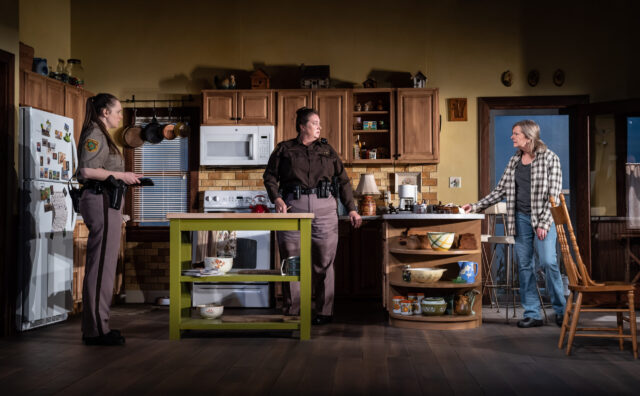
Peg (Mary Beth Fisher) and Ryan (Bubba Weiler) share a rare sweet moment in Swing State (photo by Liz Lauren)
SWING STATE
Audible Theater’s Minetta Lane Theatre
18 Minetta Lane between Sixth Ave. and MacDougal St.
Monday – Saturday through October 28, $47-$106
www.audible.com
Since at least 2006, white-nose syndrome (WNS), caused by a fungus known as Pseudogymnoascus destructans, or Pd, has been infecting and killing hibernating bats by the millions in North America. It was introduced from Europe, perhaps on the shoes of a traveler. According to the National Park Service, although there are no known cases of bat-to-human transmission, “Bats infected with either WNS or rabies may exhibit unusual behavior (e.g. erratic flying), which increases the risk for bat-human contact and exposure. Additionally, declines in bat populations can impact human health indirectly since humans depend on bats for important ecosystem services such as controlling pest insects.”
In Rebecca Gilman’s superb Swing State, extended at Audible’s Minetta Lane Theatre through October 28, the Pulitzer Prize finalist uses the bat disease as a metaphor for what’s ailing America. “The theory is that [WNS] stops their breathing so they’re startled awake from their torpid state and they start flying around, burning up calories that they can’t afford to lose,” sixty-five-year-old widow Peg Smith (Mary Beth Fisher) tells twenty-six-year-old Ryan Severson (Bubba Weiler), who does odd jobs for her on her forty-acre prairie farm. “You’ll see them flying around outside caves in the middle of the day, in the dead of winter, looking for food. But there’s nothing to eat — it’s winter, there aren’t any bugs — and eventually they burn up all their stored fat and they starve to death.”
Although the title refers to a battleground or purple state — as well as our state of mind as individuals and a country — Swing State avoids debating specific political issues, instead allowing them to arise organically as the plot develops. Among the topics that come up without being directly debated are gun control, the prison system, religion, the environment, alcoholism, health care, climate change, education, law enforcement, corporate control, and Covid-19, which some link to bats from China.
The 105-minute play is set in the summer of 2021 in the fictional Cardiff Township in the part of western Wisconsin known as the Driftless Area, which experienced no glacial drift during the last glaciation period. The show opens with Peg in her kitchen making zucchini bread. She takes the knife, brings it to her wrist, then drops it and says, “I don’t know. I don’t know what to do.” It’s a feeling many Americans have every day. A moment later, she adds, “As a species, we suck.”

Former convict Ryan (Bubba Weiler) takes a liking to deputy sheriff Dani (Anne E. Thompson) in latest Audible play at the Minetta Lane (photo by Liz Lauren)
Peg is a recent widow, childless, alone except for their dog, Walleye, and Ryan, a hired man and former convict. Peg has decided to leave her land to the Prairie Protectors (Gilman herself volunteers for the Prairie Enthusiasts) and the house and barn to Ryan.
A week later, Peg has notified the local authorities of the theft of her late husband Jim’s antique tool collection as well as Jim’s father’s classic Winchester 94 rifle. Sheriff Kris Callahan Wisnefski (Kirsten Fitzgerald) arrives with Deputy Dani Wisnefski (Anne E. Thompson), her niece, new to the force. Old tensions surface: The Callahan family owns thousands of acres around Peg’s farm, but Peg has vowed never to sell her property to them. “No Callahan is ever going to own an inch of my land,” Peg declares. Dani, who does not seem to be the law-enforcement type, likes and respects Peg, who taught her health sciences in high school, “how to be healthy in mind and body.”
The sheriff is certain that Ryan pulled off the heist and is eager to arrest him. Peg refuses to believe that he is responsible, and Ryan adamantly denies it. Dani, a sweet, innocent young woman, is bullied by her aunt into withholding her opinion, which is usually the most centrist, humanistic view, neither ultra conservative nor radically liberal. As the investigation continues, the plot twists and turns, revealing both the good and the bad that are so prevalent in contemporary America.
Gilman (The Glory of Living, Spinning into Butter) was born in Alabama, lived and worked for a long time in Chicago, and moved to rural Wisconsin about four years ago. Cardiff Township and Peg’s farm are a microcosm of society, representing a purple state with a wide variety of people as well as flora and fauna. At several points in the play, Peg brings in seeds from Shooting Star wildflowers that have been on the prairie for ten thousand years; she is trying to save and protect them, prevent them from going extinct. On the kitchen counter behind her is a box that contains Jim’s ashes. Life here, death there.

Rebecca Gilman takes a hard look at America in Swing State (photo by Liz Lauren)
Todd Rosenthal’s homey kitchen/dining room set is relatably old-fashioned, with a microwave, birdhouses atop a shelf, various pots, bowls, and jars, and books overflowing a bookcase. Evelyn M. Danner’s costumes have a timeless quality as well, Kris and Dani in brown uniforms, Ryan wearing a work shirt with a name badge, and Peg dressed primarily in pants and an unbuttoned shirt over a dark tee. Peg is not attached to her cell phone, which she regularly leaves on the table when she goes out. Kris is not fond of the tablet she now has to use while on the job. “I hate this fucking thing,” the ever-angry sheriff complains. There is never talk of modern-day equipment, only outmoded hand tools and an ancient tractor.
It could be 1971 instead of 2021. One of the only present-day references occurs when Peg explains why she no longer reads the local newspaper. “I canceled my subscription when they endorsed Trump,” she tells Kris and Dani. Peg might be clearly blue and Kris obviously red, but Dani and Ryan, the future, are more purple, not caught up in identity politics as much as struggling to make it through every day.
Each of the characters has suffered a loss of some kind, and they each have reacted differently to the sadness in their lives. Gilman’s dialogue has a poetic flavor to it, no matter what side of the fence you might be on; none of the characters are purely black and white but filled with complexity.
Gilman’s longtime collaborator, Tony winner Robert Falls (The Iceman Cometh, Shining City), directs his Goodman Theatre production with a constant tension buzzing just below the surface, ready to explode at any moment, just like America. Fisher (Frank’s Home, Boy Gets Girl) is mesmerizing as Peg; you feel her anguish in her every move as she strives to save a damaged planet while caring little about her own existence. Fitzgerald (Clybourne Park, A Moon for the Misbegotten) is staunch as the blunt sheriff, a role that could have been a stereotypical villain but is more than that here. Thompson (Gilman’s Twilight Bowl, Boy Gets Girl, and Spinning into Butter) makes a strong off-Broadway debut as Dani, an ingénue who grows up fast. And Weiler is arresting as Ryan, an enraged and exasperated young man who doubts that he will be given a second chance.
Besides bats, another flying creature that figures prominently in Swing State is the Henslow’s Sparrow, which All About Birds describes as “an easy-to-overlook bird with an almost nonexistent song,” which is also true of too many people in today’s America, beautifully captured in this heart-tugging, deeply affecting play.
[Mark Rifkin is a Brooklyn-born, Manhattan-based writer and editor; you can follow him on Substack here.]